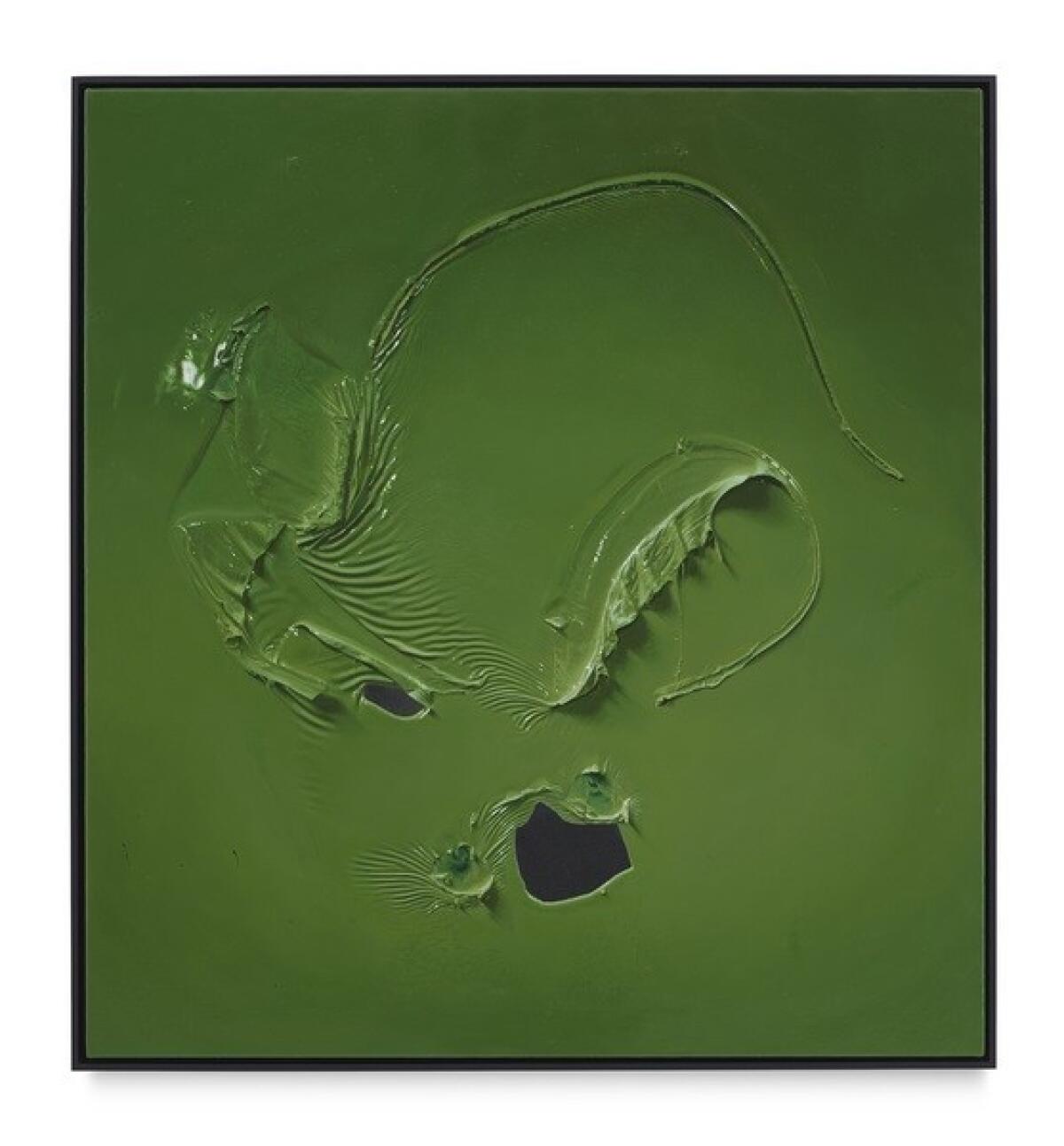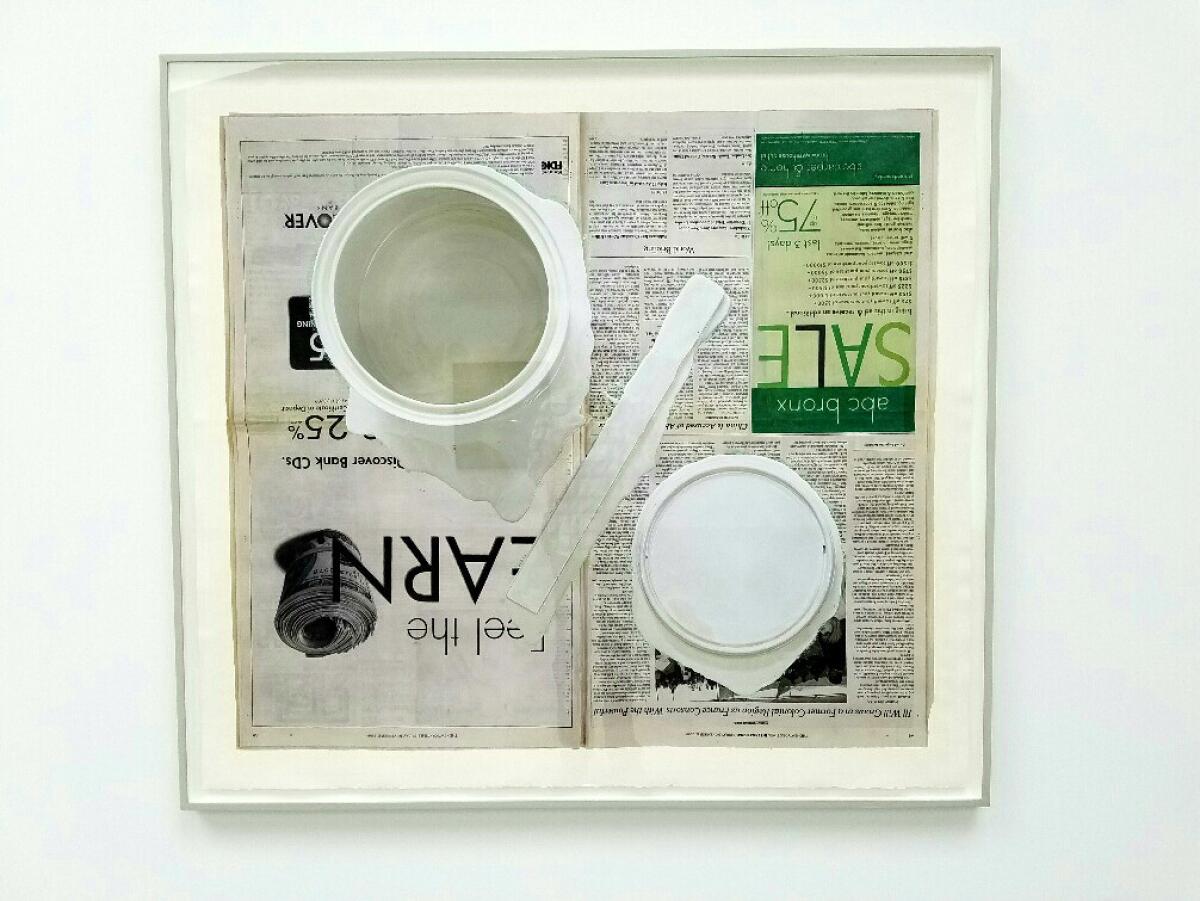Review: Paul Sietsema’s first L.A. show of new Conceptual art was worth the 14-year wait
For his first local solo show in 14 years — and one of the best gallery exhibitions of the season — L.A.-based Conceptual artist Paul Sietsema has fashioned a challenging reconsideration of classic artistic themes of decay and transformation. It begins with the color of money.
“Green painting,” one of 13 recent drawings and paintings and two film installations at Matthew Marks Gallery, scuffs up an emerald field of enamel paint on taut linen. Like the money-green monochrome paintings Stephen Prina made in 1989, when that market-mad decade for new art was cresting, Sietsema uses green color as a monetary sign.
What appear to be linear marks and ripples made by dragging the stick-end of a brush through wet vinyl paint, like an act of vandalism tearing through a pristine surface, is in fact a tour de force of illusionistic paint-handling. In purely abstract terms, the gashes recall the tradition of 19th century fool-the-eye paintings of paper money by John Haberle and William Harnett.
Near the bottom, though, there’s a twist: A large, dark shape is actually an exposed patch of the painting’s underlying linen.
This is not art as the illusion of money, in the manner of Haberle; instead, the art object is itself exposed as a material form of currency. Abstract monochrome painting, once the modern representation of an ethereal spiritual condition, is transformed into cold cash.
“Figure ground study (50/50)” re-creates pages of the New York Times used as a drop-cloth for a paint can and stirring stick. Displayed in an aerial view, the newspaper’s scrupulously hand-drawn international section is open to a full-page banking ad, one for a home furnishings sale and smaller stories about Chinese human rights abuses and the legacy of French colonialism; the open paint can, its circular lid and the angled stick between them create a double-image of a percentage sign — %.


Other trompe l’oeil paintings show a rotary-dial telephone and a credit card, both slathered in a puddled layer of poured white paint. Their histories are loaded.
The rotary phone updates market-leader Andy Warhol’s classic image of an old-fashioned black candlestick telephone as a symbol of painting as an obsolete medium of communication. “Swipe painting (Chase),” which appears to drag a credit card across the canvas to make a gestural flourish like the cartoon brushstroke in a Roy Lichtenstein, uses the plastic card’s printed ID to serve as Sietsema’s signature.
The artist’s name is equivalent to his account number. “Chase” puts a wicked pun in the parenthetical subtitle: Art today is currency chasing its own tail.
The two film installations are accompanied by clattering mechanical projectors. In an art world marked by the proliferation of sleek and silent video projections, the machinery underscores time’s passage. An artistic embodiment of vanitas, a reminder of death’s inevitability, they unspool films whose formal structures and abstract narratives are based on auction house categories for classifying and selling art.
Inquisitive rather than critical, Sietsema’s work is neither disparaging of art and commerce nor a celebration of it. He instead looks squarely at present reality — and then fabricates marvelous art of it.
Matthew Marks Gallery, 1062 N. Orange Grove Ave., West Hollywood. Through Dec. 23; closed Sundays and Mondays. (212) 243-0200, www.matthewmarks.com
Twitter: @KnightLAT
ALSO
First full Edgar Degas retrospective in nearly 30 years shows an artist who liked to be in control
Wonderfully weird 'Branchini Madonna' at the heart of an engrossing Getty show
The biggest entertainment stories
Get our big stories about Hollywood, film, television, music, arts, culture and more right in your inbox as soon as they publish.
You may occasionally receive promotional content from the Los Angeles Times.








